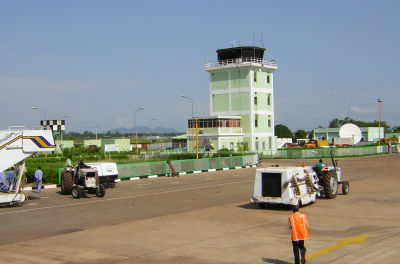![Juba International Airport [skyscrapercity.com/Getty Images]](http://www.southsudannewsagency.com/wp-content/uploads/2013/07/aaaa-Juba%20Airport-skyscrapercity_com.jpg) By James Alic Garang
By James Alic Garang
July 16, 2013 (SSNA) — Frequent visits to South Sudan leave me with the impression that there have been some service improvements at the Juba International Airport. For instance, a good number of shoeshine professionals have come up, genial bag carriers are available if you need one, a good number of high-quality minicabs that can you ferry across Juba are handy, some immigrant officers have evolved from “military command” mode to business language, and for security purposes your checked-in bag passes through a scanning machine. While these trajectories are noticeable to the naked eye, the overall service at the airport is still substandard relative to our neighboring countries, leave alone the west.
Although some services may remain run-of-the-mill for quite some time, two things, if undertaken, may lead to superior services at the airport:
(1) Opening of the new terminal. The current terminal under construction is bigger and may well provide space for more waiting lines & assorted airport transactions.
(2) Some attitudinal change in our understanding of the queuing system. For the interest of time and space, this piece focuses on the latter point.
First-Come, First Served—FCFS— is a standard service policy in most countries. If ten of you show up before a Wal-Mart cashier, chances are that you will line up and the said salesperson will attend to your need in the order of arrival. The same is true for boarding a bus, checking in at the ticket counter, disembarking the plane, and in so many situations that calls for a non-price competition in resource allocation. In other words, winning such a non-price competition is commensurate with early arrival and spending longer time in waiting. There is no polite way around waiting your turn to be serviced. Accordingly, FCFS is the norm unless you are a special needs person such as the sick, emergency crew or those with disability.
This past June 2013, I witnessed firsthand, a blatant disregard of this standard service policy at Juba International Airport. It was surprising to see that FCFS is not observed by some individuals. By the way, I am not talking about egregious VIPs but mere mortals who should be in line and wait for their turns. If you depart or arrive at Juba International Airport during one of the busy days, you will be staggered to learn that standing in line does not guarantee that you will be served in the order you arrive. Someone who arrives after you may have their bags crossed with chalk and rushed before you to have their passport stamped, and out they go. It is manifestly upsetting to see that you arrive first only to be the last one out just because you are less indecorous.
The airport scene is similar to what you might find in a refugee camp where people fight their way in through barbed corridors to receive rations, or when some self-regarding herdsmen force their cattle to the overgrazed pasture without regards to the “tragedy of the commons.”
On record, I audaciously asked one immigrant officer, “Why don’t you tell people to stand in line and be served as they arrive?” Without uttering a word, he stared at me as if he had seen a warthog climbing a tree.
But, hey, why is FCFS so big a deal?
For one, South Sudanese authorities and the public at large should begin to appreciate some received wisdom or universal standards, for without doing so we remain an outlier in many aspects. Assume East Asian businesspersons land at Juba International Airport and when they line up, someone cuts in front them. Given their gentility, how would they take this atypical behavior? I submit to you that although they may not outwardly detest it, they may paint a negative image of our people or the nation.
Second, and unless you are Robinson Crusoe, marooned and enjoying self-sufficiency at an island, competition is a fact of life. Scarcity necessitates competition over limited resources through price or non-price rationing methods. On the basis of price system, those willing and able to pay can get the services or goods they want.
However, there are other services or products in life that are acquired through mixed methods (for example, you pay for air-ticket but when embarking the plane, you have to queue up and wait for your class to enter the plane). Thus, it must be stressed that it is through such extensive list of competing wants that a policy has been agreed upon long time ago, that barring lottery or arbitrary coercion, customers, consumers or clients should be served in the order they arrive. Granting that queuing may be less efficient compared to a price system, it is far better than anarchy or rule of the jungle we see today on display by some departing or arriving travelers at the Juba International Airport.
It is, therefore, proper to fall back on the FCFS in all situations that call for it. It is high time for South Sudan to align with international best practices such as the service policy of first come, first served. By serving clients or customers in the order they arrive, you leave no room for charges of discrimination; you also save time if people follow the queue; and thirdly, you send another unmistakable message that it is courteous to wait for your turn to be served. Adherence to FCFS is one among many areas where our nation is still behind and it will need some attitudinal change, especially at airport. Agreeable to the established traditions of courtesy, I hope authorities at Juba International Airport take this policy seriously and save the public from unnecessary trouble due to nonobservance of the FCFS.
The writer can be reached at [email protected]

